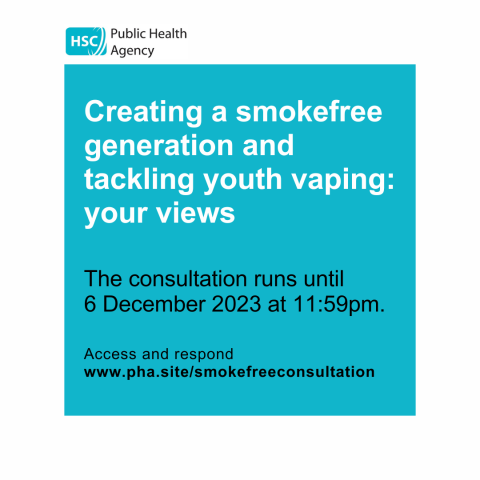PHA consultation statement - creating a smokefree generation and tackling youth vaping: your views

Smoking is the single most entirely preventable cause of ill-health, disability, and death in the UK. It is responsible for around 2,200 deaths per year in Northern Ireland. No other consumer product kills up to two-thirds of its users.
On 4 October 2023, the Department of Health and Social Care (DHSC) published a command paper ‘Stopping the start: our new plan to create a smokefree generation’ setting out proposed actions to help protect future generations from the harms of smoking by creating the first “smokefree generation”, which the UK government and devolved administrations are now seeking to consult on.
The Public Health Agency welcomes this UK-wide public consultation – ‘Creating a smokefree generation and tackling youth vaping: your views’ – and is encouraging everyone in Northern Ireland, of all ages, to have their views heard through submitting responses to it.
The consultation runs until 6 December 2023 at 11:59pm.
Smoking causes harm throughout people’s lives, not only for the smoker but for those around them. It is a major risk factor for poor maternal and infant outcomes, significantly increasing the chance of stillbirth and can trigger asthma in children. Smoking causes around 1 in 4 of all UK cancer deaths and is responsible for the great majority of lung cancer cases.
Smoking is also a major cause of premature heart disease, stroke and heart failure, and increases the risk of dementia in older people. Smokers lose an average of 10 years of life expectancy, or around one year for every four smoking years. In Northern Ireland, around 17% of the population are current smokers.
In response to the launch of the consultation, Dr Joanne McClean, Director of Public Health in Northern Ireland, said: “Ensuring people do not become addicted to smoking in the first place, and helping current smokers to quit, are two effective measures we can take to protect our population’s health. “Creating a ‘smokefree generation - through the introduction of a new law to stop children who turn 14 this year, and everyone younger than that, from ever legally being sold cigarettes would be groundbreaking in terms of avoiding preventable deaths in Northern Ireland. “It’s really important that people have their say as this is a major public health issue affecting all of us, so I encourage everyone to respond to this consultation.”
The command paper also set out measures to tackle youth vaping, and this is covered in the consultation. Selling vapes to children is already illegal in Northern Ireland, but it is clear from recent surveys that children here have tried them. According to the Northern Ireland young person’s behaviour and attitudes survey 2022 (www.pha.site/youthsurvey22), 21.3% of 11 to 16 year olds in Northern Ireland reported having ever used an e- cigarette. Due to nicotine content and the unknown long-term harms, vaping also carries risks to health and could lead to lifelong addiction for children. Nicotine vapes in particular can be highly addictive and withdrawal causes anxiety, trouble concentrating and headaches.
The health advice is clear: young people and people who have never smoked should not vape.
The Public Health Agency welcomes the inclusion of proposals in this consultation to restrict child friendly flavours and brightly-coloured packaging for vapes, and to examine the cost of them, to reduce the appeal, affordability and availability to children. Disposable vapes also cause significant environmental harm and waste management challenges as over 5 million single-use vapes are thrown away every week across the UK.
By responding to this consultation, the people of Northern Ireland will therefore also have the opportunity to influence and shape future policy around vapes and proposals to limit their availability and appeal to children.
You can access and respond to the consultation at www.pha.site/smokefreeconsultation
